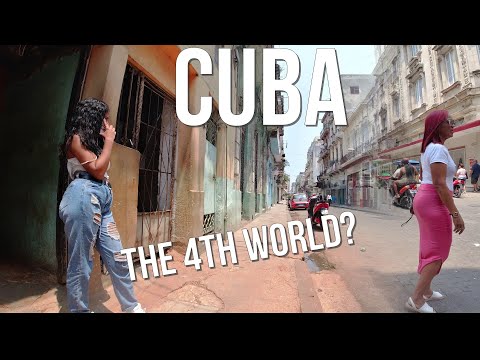
In the verdant landscapes of Cuba, beneath the Caribbean sun and vibrant culture, lies a lesser-known reality that many on the outside world might find astonishing – some Cubans live in caves, devoid of modern amenities like electricity. This stark living condition raises critical questions about poverty and underdevelopment in a country that has long been isolated due to political and economic factors. Is it fair to consider Cuba, or parts of it, as akin to a “4th World” nation? Let’s delve deeper into this issue.
#### Understanding the Concept of “4th World”
The term “4th World” is not officially recognized in global economic discussions but is sometimes used to describe extremely impoverished environments within sovereign states that resemble conditions found in failed states or nations without formal governance. It highlights areas where inhabitants live at survival levels far below what is typical even in less developed countries.
#### The Cuban Context
Cuba has been under communist rule since 1959, which has led to significant achievements such as high literacy rates and a robust healthcare system recognized worldwide. However, the flip side includes severe restrictions on economic freedom, political expression, and external influences due to long-standing embargoes led by the United States.
Amidst this complex backdrop, some Cubans have resorted to living in caves as traditional housing becomes inaccessible due to various reasons including economic hardships exacerbated by sanctions and local governmental policies. These caves lack fundamental services like electricity, running water, or proper sanitation facilities.
#### Life in Caves
For those living in such primitive conditions, day-to-day life can be extraordinarily challenging. Without access to electricity, daily chores and activities are bound by sunlight. Families use candles or makeshift lamps at night which poses significant fire risks. The absence of modern plumbing means reliance on natural water sources which may not be clean, further compounding health risks.
Children growing up in these environments face tough realities that hinder their development including limited educational opportunities due to lack of infrastructure like roads connecting them to schools or adequate school supplies.
#### Addressing Basic Human Needs
The situation for cave dwellers underscores a critical need for addressing basic human rights and needs. While the Cuban government provides universal healthcare and education, its reach and quality can be inconsistent especially in remote areas highlighted by cave settlements.
Non-governmental organizations (NGOs) and international bodies face stringent restrictions when trying to assist due to both Cuban policies and international sanctions. However humanitarian efforts continue aiming at providing solar-powered lights, sanitary supplies, and improving water access through community driven projects.
#### Is “4th World” an Appropriate Term?
Labeling parts of Cuba as “4th World” might capture the extreme poverty but does little justice to understanding the nuanced causes behind such conditions nor does it foster constructive dialogue aimed at remediation. It’s crucial for global observers not only scrutinize policies leading up such hardships but also appreciate resilience shown by those living under such circumstances.
Cuba’s struggle with parts of its population living in pre-modern conditions poses an urgent call for rethinking both domestic policy and international approach towards Havana. As we think about development metrics beyond GDP – incorporating human dignity into how we assess nations could lead toward more targeted solutions recognizing unique histories influencing current realities.
It remains imperative for the global community not just acknowledge these dire situations but actively participate resolving them through collaborative efforts respecting sovereignty nurturing global solidarity.
### Conclusion
While “cave dwelling” might evoke thoughts prehistoric times it’s very much reality some modern-day Cubans reflecting deeper socio-economic issues need earnest addressing than mere classification as “4th World”. As Cuba navigates future path amidst changing global landscapes every effort must made ensure no citizen left darkness literally metaphorically thereby truly fulfilling promise societal progress equality everyone involved.
